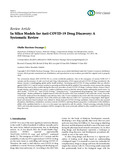Please use this identifier to cite or link to this item:
http://ir-library.mmust.ac.ke:8080/xmlui/handle/123456789/2234Full metadata record
| DC Field | Value | Language |
|---|---|---|
| dc.contributor.author | Onyango, Okello Harrison | - |
| dc.date.accessioned | 2023-06-22T11:32:15Z | - |
| dc.date.available | 2023-06-22T11:32:15Z | - |
| dc.date.issued | 2023-06-15 | - |
| dc.identifier.uri | https://doi.org/10.1155/2023/4562974 | - |
| dc.identifier.uri | https://www.hindawi.com/journals/aps/2023/4562974/ | - |
| dc.identifier.uri | http://ir-library.mmust.ac.ke:8080/xmlui/handle/123456789/2234 | - |
| dc.description.abstract | The coronavirus disease 2019 (COVID-19) is a severe worldwide pandemic. Due to the emergence of various SARS-CoV-2 variants and the presence of only one Food and Drug Administration (FDA) approved anti-COVID-19 drug (remdesivir), the disease remains a mindboggling global public health problem. Developing anti-COVID-19 drug candidates that are effective against SARS-CoV-2 and its various variants is a pressing need that should be satisfied. This systematic review assesses the existing literature that used in silico models during the discovery procedure of anti-COVID-19 drugs. Cochrane Library, Science Direct, Google Scholar, and PubMed were used to conduct a literature search to find the relevant articles utilizing the search terms “In silico model,” “COVID-19,” “Anti-COVID-19 drug,” “Drug discovery,” “Computational drug designing,” and “Computer-aided drug design.” Studies published in English between 2019 and December 2022 were included in the systematic review. From the 1120 articles retrieved from the databases and reference lists, only 33 were included in the review after the removal of duplicates, screening, and eligibility assessment. Most of the articles are studies that use SARS-CoV-2 proteins as drug targets. Both ligand-based and structure-based methods were utilized to obtain lead anti-COVID-19 drug candidates. Sixteen articles also assessed absorption, distribution, metabolism, excretion, toxicity (ADMET), and drug-likeness properties. Confirmation of the inhibitory ability of the candidate leads by in vivo or in vitro assays was reported in only five articles. Virtual screening, molecular docking (MD), and molecular dynamics simulation (MDS) emerged as the most commonly utilized in silico models for anti-COVID-19 drug discovery. | en_US |
| dc.language.iso | en | en_US |
| dc.publisher | Advances in Pharmacological and Pharmaceutical Sciences | en_US |
| dc.subject | Silico, Models,Anti-COVID-19, Drug, Discovery, ,Systematic, Review | en_US |
| dc.title | In Silico Models for Anti-COVID-19 Drug Discovery: A Systematic Review | en_US |
| dc.type | Article | en_US |
| Appears in Collections: | Gold Collection | |
Files in This Item:
| File | Description | Size | Format | |
|---|---|---|---|---|
| 4562974.pdf | 502.14 kB | Adobe PDF |  View/Open |
Items in DSpace are protected by copyright, with all rights reserved, unless otherwise indicated.
